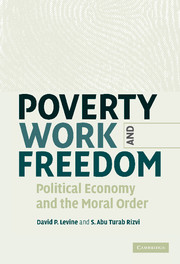8 - Work and satisfaction
Published online by Cambridge University Press: 22 September 2009
Summary
A commonly stated motivation for economic policy is to benefit people's welfare, happiness, or satisfaction. We want to promote particular policies because of their beneficial impact on people's lives. Yet central aspects of conventional economic method seem to prejudge what makes people's lives go well. In the neoclassical conception, individuals choose goods and services to maximize utility subject to an income constraint, where income derives primarily from the sale of labor. Thus the goal of economic activity is consumption, which leads to higher utility. Consumption is constrained by income, so income and utility or satisfaction should be clearly related. Labor, on the other hand, is avoided, since it enters negatively into the utility function. Labor and leisure relate as negative to positive, the amount of work depending on a tradeoff between labor and leisure that is affected by the wage. Thus it is assumed that what makes life go well is income and consumption; what is to be avoided is labor. The amount of work performed depends on the amount of disutility that must be endured to derive income from the sale of labor. To the extent we want to maximize welfare, we would want to reduce work and increase income and consumption.
With this answer to the question of what makes life go well, we also have a solution to the problem of defining and alleviating poverty.
- Type
- Chapter
- Information
- Poverty, Work, and FreedomPolitical Economy and the Moral Order, pp. 95 - 113Publisher: Cambridge University PressPrint publication year: 2005



